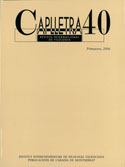Contraintes et libertés textuelles
DOI:
https://doi.org/10.7203/caplletra.40.4837Palabras clave:
genre Types (genres des texts), Type of speeches, textual Restrictions, textual Freedoms, Narrative, Praxeology, Expression of Temporality, literary Work Resumen
Resumen
The article starts from a conception of language according to which the semiotic units that speakers use do not emanate from individual mental processes but from the socialization of representation instruments which, being individual elements initially, have later been involved in processes of communicative circulation. In the same way that, in each language, verbal uses are limited by a series of restrictions in the constitution of some phonic, lexical or morphosyntactic structures, there are also some other constraints that affect textual genres. This means that these are the product of the history of the uses of language and that they work at a praxeologic level. These ideas apply to the study of expression of temporality in the story (récit) and in the narration (narration), with exemplification taken from real texts, mostly of literary character. Both in ordinary verbal work and in literary work, the freedom of the style works on
some pre-existent textual models which have to be known and mastered in order to adapt them to the specific conditions of each ordinary verbal action or literary production.
 Descargas
Descargas
Descargas
Publicado
Cómo citar
-
Resumen282
-
PDF (Català)111
Número
Sección
Licencia
El autor o autora que dirija un trabajo a la redacción de Caplletra para ser publicado tiene que ser la persona titular legítima de los derechos de explotación. La legitimación para la publicación del trabajo tiene que incluir también las imágenes, las tablas, los gráficos y otros materiales que puedan complementar el texto, con independencia de si es su autor o autora.
Copyright. Al publicar el trabajo en la revista, el autor o autora cede a Caplletra. Revista Internacional de Filologia los derechos de explotación (reproducción, distribución y comunicación pública), tanto para la edición impresa en papel como para la versión electrónica.
Todos los trabajos publicados en Caplletra se encuentran bajo una licencia Creative Commons del tipo Reconocimiento-NoComercial-SinObraDerivada 4.0.
RESPONSABILIDAD
Caplletra. Revista Internacional de Filologia no se identifica necesariamente con los puntos de vista sostenidos en los trabajos que publica.Caplletra. Revista Internacional de Filologia declina toda responsabilidad derivada de cualquier vulneración eventual de los derechos de propiedad intelectual que pudiera ser llevada a cabo por los autores o autoras.






